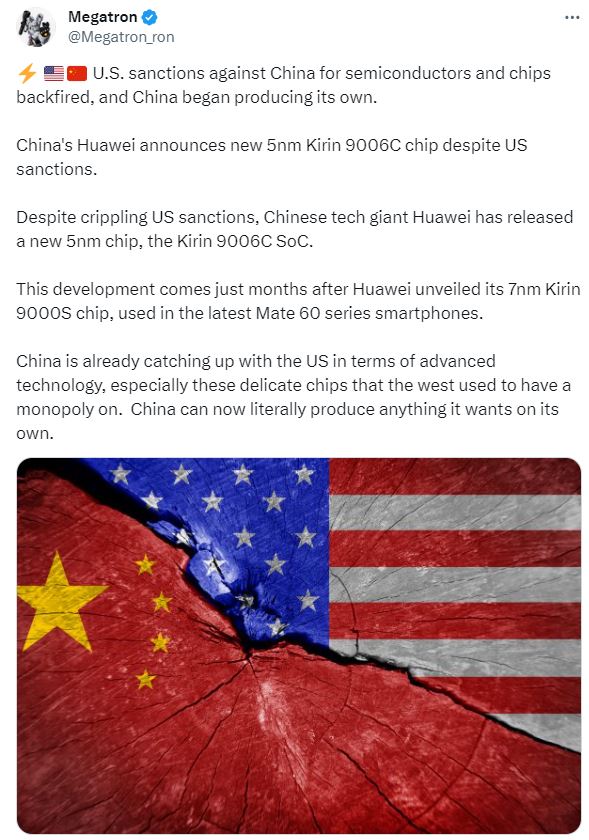47% of consumers in Malaysia like AI brand interactions, but just 1 in 10 brands use generative AI for better customer experience, an Adobe study finds.. (Image – Shutterstock).
Could Malaysia’s semiconductor industry help China?
- Malaysia’s semiconductor industry is considered one of the fastest-growing sectors in the world.
- Several Chinese semiconductor design companies are tapping Malaysian firms for chip assembly
- Assembling chips does not contravene any US restrictions.
Malaysia’s semiconductor industry is considered one of the fastest-growing sectors in the world. The country is already a hub for the semiconductor supply chain, supplying key components to the industry over the past few years.
Malaysia has also witnessed continued investments in the semiconductor industry. Some of the major players manufacturing chips and other semiconductor components in the country include Intel, AMD, Broadcom, Infineon, Bosch, GlobalFoundries and many more.
The country currently controls 13% of the global market for packaging, assembly and testing services for semiconductors. It is also the sixth largest source of semiconductor exports in the world. This makes the country an ideal supplier in the semiconductor supply chain, with the US being a major trade partner in the industry too.
According to a report by Nikkei Asia, chip companies Jabil, Micron, Bosch, Western Digital and Lam Research are all expanding their manufacturing footprints in the area around Penang in Malaysia, stretching from Kulim in the north to the Batu Kawan Industrial Park in the south. DHL Express is constructing several logistics centers in the area, after launching direct cargo flights five days a week between Penang and Hong Kong, a chip-trading hub close to mainland China, in mid-2021.

Are the sanctions actually making a difference to China?
Semiconductor industry in Malaysia
Given the development of the chip industry in Malaysia, China may now see opportunities to rely on the country not only to solve its supply chain problems but also as a solution to the sanctions that have been imposed on it.
Last year, the US government enforced chip sanctions on China, intending to slow down the country’s capabilities in developing AI. However, there were some loopholes in the sanctions that allowed Chinese firms to keep buying and building the chips used to train some of the world’s most advanced AI algorithms.
The US only realized the loopholes when companies like Huawei were able to develop a 5G phone despite sanctions. Companies like Nvidia were also still doing business with China but with a different version of chips, which were developed based on the limits of the sanctions. For example, the A800 and H800 chips were heavily sourced by Tencent and Alibaba in China.
Jensen Huang, CEO of Nvidia, who was in Malaysia recently, reaffirmed that China remains an important market for the company. Huang explained the situation, saying, ‘The US has determined to regulate our technology, the highest end of our technology, and limit its access to China. So, the regulations specify the maximum performance we can ship to China, and we will follow the regulations precisely – and very explicitly do so.” He added that Nvidia is currently developing new chips specifically for the Chinese market.
Huang also confirmed that Malaysia is a key player not just in the semiconductor supply chain but also in the data center industry in the region.
In Malaysia particularly, the data center infrastructure, “a layer of computing which is one of the most important parts of AI and cloud, is very successful,” Huang said. “And so I think that we’re going to see Southeast Asia participate across the entire technology stack, and Malaysia play a role in cloud infrastructure,” he added.
China could make use of Malaysian tech proficiency, while US firms like Nvidia also recognize the country’s potential. (image by Shutterstock).
Another loophole?
According to a report by Reuters, several Chinese semiconductor design companies are tapping Malaysian firms for chip assembly. The report said that the Chinese companies are asking Malaysian chip packaging firms to assemble graphics processing units (GPUs).
Assembling chips does not contravene any US restrictions. The sources also said that the assembling is not the same as the fabrication of the chip wafers. While the sources of the Reuters report declined to name the companies involved in the assembling, a few contracts have already been agreed.
The US recently updated its sanctions on chips towards China, which focused on covering some of the loopholes that were present in the previous sanctions announced in 2022. The focus of the sanctions remains mainly on the sale of sophisticated chipmaking equipment.
Malaysia, a major hub in the semiconductor supply chain, is seen as well placed to grab further business as Chinese chip firms diversify outside of China for their chip assembling needs.
The Reuters report quoted Unisem chairman John Chia as saying “Many Chinese chip design houses have come to Malaysia to establish additional sources of supply outside of China to support their business in and out of China.”
Unisem provides semiconductor assembly and test services in Malaysia. Its packaging and testing facilities are located in Ipoh, Perak, Malaysia, Chengdu, China, and Batam, Indonesia. It also has wafer bumping facilities in Ipoh, Perak, Malaysia and Chengdu, China. China’s Huatian Technology is a majority shareholder.
Apart from chip design, China is Malaysia’s largest trade partner. Malaysia is also part of China’s “One Belt One Road” policy. Chinese investments remain high in the country, across a variety of industries.
Asked whether accepting orders to assemble GPUs from Chinese firms could potentially provoke US ire, Chia said Unisem’s business dealings were “fully legitimate and compliant,” and that the company did not have the time to worry over “too many possibilities.”
Unisem’s customers in Malaysia included those from the United States as well. The US Department of Commerce did not respond to requests for comment.
READ MORE
- Safer Automation: How Sophic and Firmus Succeeded in Malaysia with MDEC’s Support
- Privilege granted, not gained: Intelligent authorization for enhanced infrastructure productivity
- Low-Code produces the Proof-of-Possibilities
- New Wearables Enable Staff to Work Faster and Safer
- Experts weigh in on Oracle’s departure from adland


